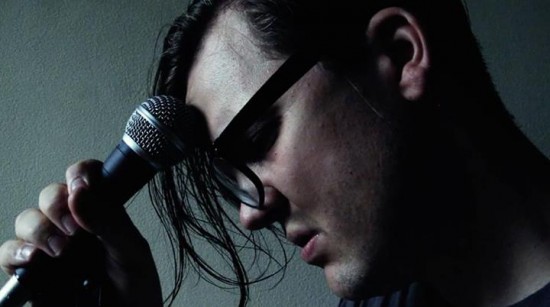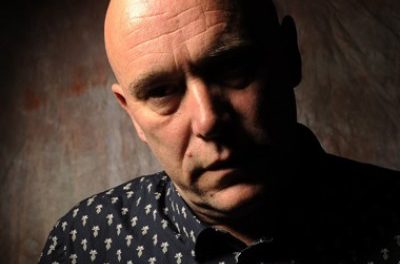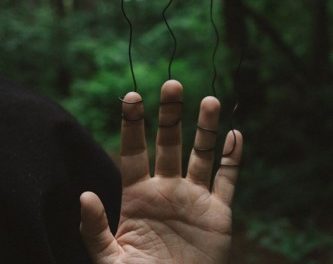“As for whether humanity has a chance to improve things, we have chances every day, big and little. We’re just not taking them.”
In our review of Seeming’s Madness & Extinction we made sure to note the benefits of careful examination. The passage of a few months has certainly proven that out, as the debut LP from Alex Reed and Aaron Fuleki (post their releases as cult darkwave act ThouShaltNot) has continued to get spins at our HQ, the stature of it’s genre-defying pop songs growing with each considered listen. Having just completed their first tour, we caught up with Alex Reed to discuss finality, how his academic work on music (including the excellent Assimilate) affects the making of it, and the idea of artistic obligation.
ID:UD: When listening to Madness & Extinction it’s easy to focus on the theme of endings (“Goodnight London” and “Eyes of Extinction”), but there’s also a strong sense of wonder at what might come after the grand finale of the human race. Was it important for you to balance those ideas when writing the album? Did you set out to want to make an album about the apocalypse without stooping to nihilism?
Alex Reed: We weren’t consciously avoiding nihilism—and for that matter, I think people often misunderstand nihilism, treating it as a self-evident dead end, which it doesn’t have to be (here’s where I plug the writings of Ray Brassier). But I grant that the album isn’t quite nihilist, nor am I myself a nihilist. To the contrary, I embrace a lot of beliefs, mysticism, and paradox, and I think that’s part of what translates into the wonder you’re talking about—and I’ll get more specific about that in just a second.
You’re right to hear a concern with endings on the album. Specifically, it tries to sweep away any assumptions about the world’s future whose articulation begins with “I” or “we.” It’s a conscious attempt to throw out the baby with the bathwater.
Look, art typically reflects or suggests a reality in only vague, indirect ways. I wanted that to be an asset with this record, and not a liability. I’ve made hopeful and skygazing music in the past—The White Beyond being the clearest example—but that kind of art risks egging on a terrible state of real-world affairs by suggesting that somehow it’ll all be okay and that problems will fix themselves if we just keep our chin up and if we just convince ourselves that our actions are well-intended. It’s a cozy idea. But at this point in my life, signs of “nobility,” “truth,” “justice,” or any sort of “go-with-the-flow” sensibility just strike me as somewhere between naïve and poisonous. (That’s a big part of why I ultimately grew impatient with ThouShaltNot, whether or not dropping that band made good career sense.)
But this is where art’s distance from reality comes into play. Do I actually want to vanquish humanity? Do I really want to deprogram myself so thoroughly that I become a proverbial sasquatch? Do I want investment bankers to commit mass suicide? If I were running for congress, my campaign would be doomed if any of these questions were even on the table.
As an artist, though, I don’t have to treat extreme what-ifs as absurd or moot. Quite to the contrary, I’m trying to expand listeners’ worldview to allow for such questions at all, because they hint at potentially valuable new ways of considering our past and future, both as individuals and in groups. The only way for questions like this to be taken seriously is to paint an unblinking, unironic landscape in which their answer is absolutely “yes”—and not in any murderous gross-out monstrosity, but in a redemptive way. And in a way immersive enough to constitute a viable little reality for those whose only comfort and hope lies in such a radically different world, whether “real” or not. I think that any apocalypse, destruction, erasing, or nonbeing that underlies Seeming’s music has an ethical obligation to be the most beautiful thing imaginable.
Madness & Extinction may be politically extreme; it’s almost certainly more extreme than I myself appear to be. But to change an immense and diluted world, any single drop in the bucket needs to be of a very high concentration.
“Art needs to be unafraid to reinvent craft.”
ID:UD: Can you talk about the idea of obligation when it comes to creation? It’s an interesting choice of words, especially when not necessarily discussing the messages built into your work but the method of their delivery. In what ways do you feel it was important for the record to sound like it does?
Alex Reed: Actions and visuals and sounds are all tied into values and attitudes and assumptions. I can’t meaningfully tell you or anyone how to hear our music, but I can certainly make music in a way that pretty strongly suggests certain meanings. That’s why, for example, the vocals on the record so often sound like they’re being sung through some kind of gauze: the humanity isn’t front and center. It’s why the opening line of the whole thing is “Hiding. Hiding under the ground. Is the world still turning round?” Communicating insanity matters to me. Communicating ecological desperation matters to me. These are ideas that, at least to my ears, don’t sound like pop music, or EBM, or neofolk, or whatever. Art needs to be unafraid to reinvent craft.
ID:UD: Tied into the themes of ending is a strong sense that the world, and its non-human inhabitants have been poorly served by humanity. It’s a different take on animal rights than is often seen in music, as it’s more about positing a better scenario for the planet without us in the picture rather than from us mending our ways. How much of that reflects your own personal beliefs about the state of the world? Do you think humanity has a chance to figure it out before it’s too late?
Alex Reed: The idea that we’re stewards of Earth is pretty presumptuous, but I certainly understand why we’d take up that role upon realizing how irrevocably and imperialistically we’ve imposed ourselves on the planet. Similarly, the idea of “animal rights” presupposes that their freedom is ours to grant or withhold, and that’s another curious notion at best. Of course our current reality offers us convenience, and it’s silly to get mad at cave people for putting humankind on the path toward agricultural development. But it’s pretty crappy that we’re in a functional us-or-them scenario, and I think that if unmaking and remaking reality is the only alternative to this mess, then such an unmaking deserves to be given voice.
As for whether humanity has a chance to improve things, we have chances every day, big and little. We’re just not taking them.
ID:UD: So much of what we associate with Madness & Extinction is thematic instead of stylistic; we feel like you’ve left the sonic palette of the project endless directions to go, while writing about some very specific topics (albeit in varied and unrestricted ways). How does that affect the process of writing new material? How do you keep Seeming’s character intact while eschewing repeating yourself?
Alex Reed: Back when Aaron and I were doing ThouShaltNot, we were always trying to expand the sound palette with every album, so that once that project was a few records deep, we felt we’d set up broad enough precedent to move between, for example, cabaret piano, Gridlock-style noise, indie rock, folk, EBM, and orchestral pop. That was accomplished, I think, through a kind of overstatement. We asserted a lot of stylistic markers, even if they were in conflict. In retrospect, there were times when it worked well, and there were times when it didn’t really.
With Seeming, we’ve tried for an expansive set of stylistic possibilities, but I think it’s done maybe more through understatement. Like on “The Eyes of Extinction,” all it takes it a snare drum triplet to get a martial vibe. Compare that with ThouShaltNot’s “True Love,” where we literally played battlefield samples underneath my screaming. We’re much more interested in subtlety of sound. We want to choose the right way to make any given song and then do it.
As for making new material, a little bit of repetition isn’t really a problem. Like when we covered “Precious Things,” I paused for a moment and asked myself, “Geez, do you really want to use that hammered dulcimer again after making it so central in ‘The Shadows’ and ‘The Burial’?” And you know what? The answer was yes. It sounds great, and it’s become almost a signature part of the band’s arsenal.
I think we do (and will continue to) stay fresh in what we record. Part of what sets the tone is the song selection, and there’s a lot of very careful thought that goes into piecing an album together. I’m a prolific songwriter, and only a fraction of what I write fits with Seeming. I’m doing a folk record right now on the side, and I’ve written breezy feelgood teen pop songs that I’ve given to other performers. Right now, for instance, I’ve got a bunch of country and jazz pieces that I don’t even know what to do with. If k.d. lang wants to do an album of murder ballads, I’ve got one waiting for her.
Anyhow, though, the songs suggest their own treatment, and so while we’re habitually drawn toward synth pads and tom-toms, if a song doesn’t need them, then it won’t get them. It’s pretty easy for us to approach it this way, because a lot of a songs start off as demos on acoustic guitar or piano, and so we don’t go into production autopilot very often. We’ll occasionally experiment and just make noise or beats or whatever in the absence of any pre-written piece, but most of the time we already know the song’s structure, harmonies, and mood before we turn on the computer. We never ask, “What will the drums do in this song?” We ask, “What does this song need?” And sometimes the answer doesn’t even involve drums. Or bass. Or voice. I keep a printout of Eno’s Oblique Strategy cards on my wall.
Hey, as I look through my demos and files right now, here’s a bone or two: we just spent some time with a 220-bpm song, trying to figure out how to make it high-energy without sounding manic or stupid; we also just tried a bebop version of a song that started as straight-up EBM (an interesting experiment, though I doubt it’ll stay this way); and there’s a track we just did for a forthcoming EP where the original demo was cheesy synthpop, and the final version is this really miserably dire and slow acoustic rendition. Long story short, Aaron and I are always rethinking our approach in the studio. It’s just part of good musicianship.
ID:UD: Your music tends to be very full and lush at the level of production and arrangement if nothing else. How did you go about adapting these songs for a live environment with two musicians? Were you anticipating bringing Seeming out on the road while you were first working on the material, or was it a recording project first and foremost?
Alex Reed: So, recordings place themselves in kind of imagined space and time by way of their sound palette, echoes, dynamics, and a bunch of other features. We tried with Madness & Extinction’s sounds, arrangements, and mixing to find a sonic space that positioned a burgeoning, fulminant sense of strange, new life at the edge and the end of everything human: an alien jungle waiting to explode from inside a forgotten warehouse. The lushness comes some from that approach, and probably also from my own instincts as a songwriter and producer; I can err to that side, for sure. “Distance” was a word we used a lot when making the record. And maybe not every song on the album creates that same space—I think, for example, with “Goodnight London” and “Beautiful for the Last Time,” we instinctively played it a little safer, given that they really are pop songs. It’s kind of funny, then, that those are the two songs whose arrangements we’ve changed the most in live performance.
When we made the record, we definitely weren’t thinking yet of how to play it live. All I knew is that I wanted to work with as few people onstage as possible. So for the tour, Aaron and I first figured out the drum palette for each song; we went back to the stem tracks for the record, sampled them, and loaded them into his triggers. The music is heavily driven by percussion and vocals, so we made sure that we’d be doing all of that live. We stripped down backing tracks to their essentials—just a few synths—which allows us to have as little of the show canned as a possible, and which also makes room in the mix for some spacious effects if we want them. We’re trying both to recreate the album’s space in the rooms we play and also to bring an immediacy and maybe a new light to the songs.
ID:UD: The first description of Seeming’s music we came across was “post-gothic, post-political, post-dance, post-human,” which is a pretty literal reference to the themes on Madness & Extinction but also alludes the album not being tied to any one genre or tradition. Is there something to the idea of Seeming being “post” or “after” those things, rather than just having them be absent?
Alex Reed: Well this is like the old “Don’t think of an elephant” trick, isn’t it? Culture and pop have trained us so well to latch onto convenient facets of music: there’s a beat, so you dance to it; someone’s singing words, so you identify with her; a record company put the song out, so you stylistically associate performers with their labelmates.
To be fair, I don’t even know what it would mean for people to hear Seeming’s music—or any music—entirely without assumptions. But we do try to show people how to take the music on its most rewarding terms. For example, Madness & Extinction doesn’t have any dance songs on it. Maybe this is a turn-off for some people, but it successfully communicates to a lot of people that zoning out is not an option. In fact, our only dance song, the single “Silent Disco,” is expressly about being alienated from the social experience of dancing.
You mentioned playing live just a moment ago. One of the things that pleased us most on this first tour that we just finished was that people actually paid attention to the songs when we were onstage. More than with other bands I’ve played in, audiences got it. So I think that whatever artistic intent that bit of sloganeering underlies, it’s one that’s consistent woven into what we’re doing.
As for “post-gothic,” I think it works for two reasons. First, it relates to gothic in the way that post-rock relates to rock: we take elements of gothic music—reverb, minor keys, church bells—but we use them to create a music that, for the most part, doesn’t meaningfully stick to the personal, political, formal, or stylistic blueprints of what people call gothic. Second, the gothic as a broad idea relates to the hidden, the submerged, the secreted, the underbelly of artifice. There are a few exceptions, but for the most part, our music lays secrets bare, tears down walls, and denies any escape or hiding from a breathing ecosystem so vast as to mock the very idea of a privileged human internality.
ID:UD: When you talk about “people getting it” we’re getting a sense of relief from you. Obviously the scope of Madness & Extinction demands a certain level of investment to do justice to what you’re writing about, but was there a point where you felt you might lose the audience?
Alex Reed: Actually no. This is the most confident I’ve ever felt in a record. But it’s still gratifying to see that translate properly. If there was any worry concerning how people would hear the record, it was less about them getting bogged down or alienated, and more about them happily bopping along to it, taking it too lightly. Ironically, I think part of what makes it connect effectively is that the album makes almost no attempt to please audiences on their own terms—hence it having no dance songs, like I said. We made the album without input from record labels, and when we shopped it around, we did so with the caveat that its stylistic content was not up for debate. And similarly, when it came time to make the live show, we thought pretty carefully about our visuals and our body language. I mean, Aaron and I are totally goofy, nerdy dudes. Despite this interview being really dire sounding, we joke a lot and we’re good at parties. But Seeming isn’t some personal reflection of our whole selves. It’s a serious and specific way of putting serious and specific ideas across. Once we identified that—which we’d never really done before in our old band—then the whole project was in much clearer focus to everyone.
ID:UD: Did the process of writing Assimilate affect your own creative process? What intersections (if any) do you notice between your academic and creative work?
Alex Reed: Writing Assimilate was life-changing. It’s one thing to muse about industrial music as “resistant” in some nondescript sense; it’s another thing entirely to enter the headspace of people who were reacting against very large-scale oppressions, arbitrary systems, and controls. It was important to me that I understand their perspectives, take them dead seriously, and empathize with both their worldviews and their means of reaction.
It’s funny; when my wife and I talk about our personal lives or about politics or our careers, she’ll sometimes respond to my half of the conversation with, “Are you saying that because it’s a good idea, or because it’s what performance artists from the 1970s would say?” She’s only half joking, I think.
But her comments are relevant here, because of course the other thing I tried to do in Assimilate was engage with, respond to, and critique industrial music’s political and semiotic methods. I get at that particularly in the chapters on fascism and race, and in the last part of the book. One effect of all my reading and writing about industrial music was that it got me thinking, “How might I address some of these issues through my own music?” Very few people have called my records “industrial,” but I’m certainly concerned on a personal and expressive level with a lot of the issues that industrial music has historically taken up. And I’d like to think that Seeming is addressing them in a way that’s pretty head-on and yet avoids a lot of the missteps that have hobbled the genre at times.
My future academic work is headed toward some big questions about economies and identities, although it’s branching beyond industrial music and into mid-80s hip-hop. As for Seeming, I’ll add that the plans for our next record take this all a step further in some ways that might be high-risk, but might also yield high and new rewards.
Seeming’s Madness & Extinction is available now, digitally and on CD from Artoffact Records.



![An Interview With [:SITD:]](https://www.idieyoudie.com/home/wp-content/uploads/2011/10/sitd-440x264.jpg)


